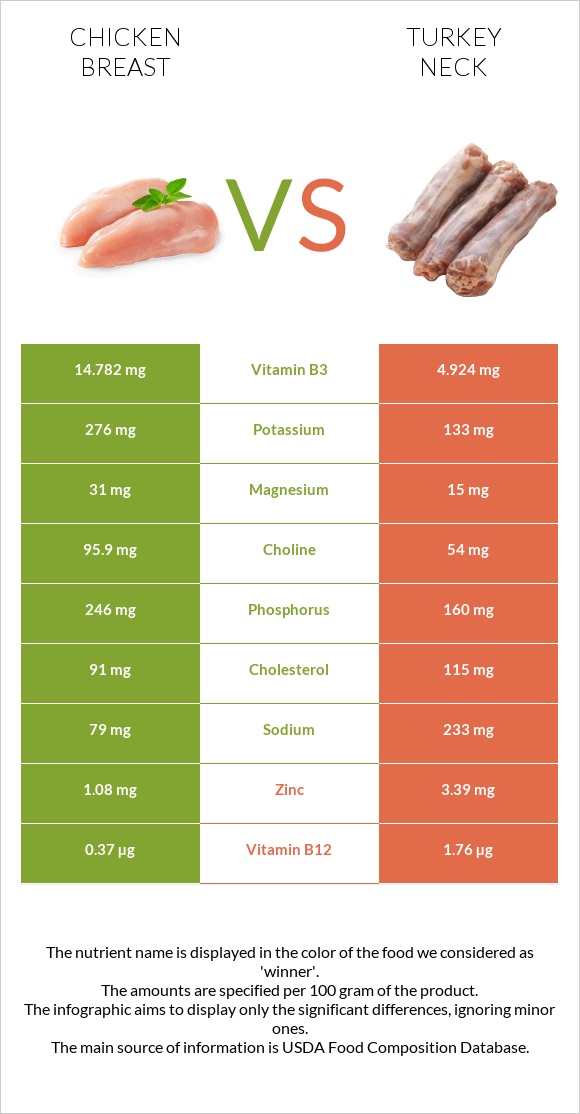Chicken breast vs. Turkey neck — In-Depth Nutrition Comparison
Compare
Important differences between chicken breast and turkey neck
- Chicken breast has more vitamin B3, vitamin B6, phosphorus, and choline; however, turkey neck has more vitamin B12, zinc, copper, and vitamin B2.
- Chicken breast's daily need coverage for vitamin B3 is 62% more.
- Chicken breast has 2 times more choline than turkey neck. Chicken breast has 95.9mg of choline, while turkey neck has 54mg.
- Chicken breast is lower in cholesterol.
The food varieties used in the comparison are Chicken, broilers or fryers, breast, meat only, cooked, fried and Turkey from whole, neck, meat only, raw.
Infographic

Infographic link
Mineral Comparison
Mineral comparison score is based on the number of minerals by which one or the other food is richer. The "coverage" charts below show how much of the daily needs can be covered by 300 grams of the food.
| Contains more MagnesiumMagnesium | +106.7% |
| Contains more PotassiumPotassium | +107.5% |
| Contains more IronIron | +12.9% |
| Contains more PhosphorusPhosphorus | +53.8% |
| Contains less SodiumSodium | -66.1% |
| Contains more CalciumCalcium | +50% |
| Contains more CopperCopper | +163% |
| Contains more ZincZinc | +213.9% |
| Contains more ManganeseManganese | +166.7% |
Vitamin Comparison
Vitamin comparison score is based on the number of vitamins by which one or the other food is richer. The "coverage" charts below show how much of the daily needs can be covered by 300 grams of the food.
| Contains more Vitamin EVitamin E | +250% |
| Contains more Vitamin B1Vitamin B1 | +54.9% |
| Contains more Vitamin B3Vitamin B3 | +200.2% |
| Contains more Vitamin B5Vitamin B5 | +29.8% |
| Contains more Vitamin B6Vitamin B6 | +75.8% |
| Contains more Vitamin KVitamin K | +∞% |
| Contains more Vitamin AVitamin A | +85.7% |
| Contains more Vitamin DVitamin D | +200% |
| Contains more Vitamin B2Vitamin B2 | +68.8% |
| Contains more Vitamin B12Vitamin B12 | +375.7% |
| Contains more FolateFolate | +25% |
All nutrients comparison - raw data values
| Nutrient |  |
 |
DV% diff. |
| Vitamin B3 | 14.782mg | 4.924mg | 62% |
| Vitamin B12 | 0.37µg | 1.76µg | 58% |
| Protein | 33.44g | 16.51g | 34% |
| Zinc | 1.08mg | 3.39mg | 21% |
| Vitamin B6 | 0.64mg | 0.364mg | 21% |
| Phosphorus | 246mg | 160mg | 12% |
| Copper | 0.054mg | 0.142mg | 10% |
| Cholesterol | 91mg | 115mg | 8% |
| Choline | 95.9mg | 54mg | 8% |
| Sodium | 79mg | 233mg | 7% |
| Vitamin B2 | 0.125mg | 0.211mg | 7% |
| Vitamin B5 | 1.04mg | 0.801mg | 5% |
| Magnesium | 31mg | 15mg | 4% |
| Potassium | 276mg | 133mg | 4% |
| Selenium | 26.2µg | 28.6µg | 4% |
| Calories | 187kcal | 125kcal | 3% |
| Polyunsaturated fat | 1.07g | 1.478g | 3% |
| Fats | 4.71g | 6.04g | 2% |
| Iron | 1.14mg | 1.01mg | 2% |
| Vitamin E | 0.42mg | 0.12mg | 2% |
| Manganese | 0.021mg | 0.056mg | 2% |
| Vitamin B1 | 0.079mg | 0.051mg | 2% |
| Vitamin K | 2.4µg | 0µg | 2% |
| Saturated fat | 1.29g | 1.647g | 2% |
| Vitamin D | 5 IU | 13 IU | 1% |
| Calcium | 16mg | 24mg | 1% |
| Vitamin A | 7µg | 13µg | 1% |
| Vitamin D | 0.1µg | 0.3µg | 1% |
| Net carbs | 0.51g | 0g | N/A |
| Carbs | 0.51g | 0g | 0% |
| Folate | 4µg | 5µg | 0% |
| Monounsaturated fat | 1.72g | 1.824g | 0% |
| Tryptophan | 0.39mg | 0.176mg | 0% |
| Threonine | 1.412mg | 0.6mg | 0% |
| Isoleucine | 1.765mg | 0.473mg | 0% |
| Leucine | 2.509mg | 1.144mg | 0% |
| Lysine | 2.836mg | 1.363mg | 0% |
| Methionine | 0.925mg | 0.432mg | 0% |
| Phenylalanine | 1.328mg | 0.532mg | 0% |
| Valine | 1.659mg | 0.528mg | 0% |
| Histidine | 1.037mg | 0.448mg | 0% |
| Omega-3 - EPA | 0.01g | 0.002g | N/A |
| Omega-3 - DHA | 0.03g | 0.005g | N/A |
| Omega-3 - DPA | 0.02g | 0.008g | N/A |
Macronutrient Comparison
Macronutrient breakdown side-by-side comparison
Protein:
33.44 g
Fats:
4.71 g
Carbs:
0.51 g
Water:
60.21 g
Other:
1.13 g
Protein:
16.51 g
Fats:
6.04 g
Carbs:
0 g
Water:
75.92 g
Other:
1.53 g
| Contains more ProteinProtein | +102.5% |
| Contains more CarbsCarbs | +∞% |
| Contains more FatsFats | +28.2% |
| Contains more WaterWater | +26.1% |
| Contains more OtherOther | +35.4% |
Fat Type Comparison
Fat type breakdown side-by-side comparison
Saturated fat:
Sat. Fat
1.29 g
Monounsaturated fat:
Mono. Fat
1.72 g
Polyunsaturated fat:
Poly. Fat
1.07 g
Saturated fat:
Sat. Fat
1.647 g
Monounsaturated fat:
Mono. Fat
1.824 g
Polyunsaturated fat:
Poly. Fat
1.478 g
| Contains less Sat. FatSaturated fat | -21.7% |
| Contains more Poly. FatPolyunsaturated fat | +38.1% |
~equal in
Monounsaturated fat
~1.824g





